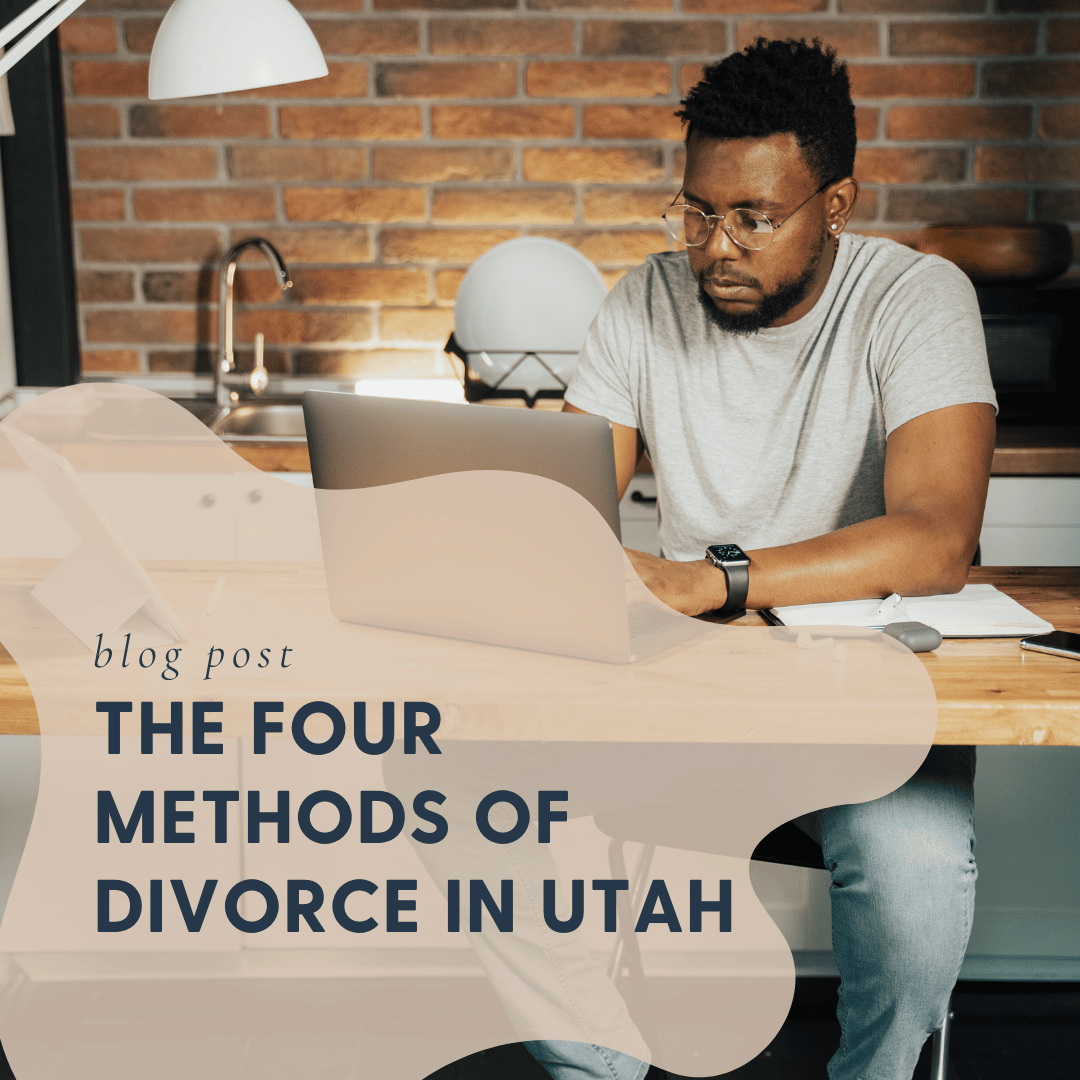|
Divorce can be a challenging and emotionally charged experience. Emotions can be overwhelming, clouding your judgment and invoking fight, flight, or freeze responses, which can interfere with your ability to think clearly and rationally. These conditions are less than ideal for making important decisions about your divorce. So it makes sense to use a divorce method that minimizes conflict and creates a more amicable atmosphere, whenever possible. Is this even possible? (Yes, it is.) It all begins with finding the right method of divorce for you. (↓) There are four (4) primary methods to get a divorce in Utah. Depending on your situation, some methods may be quicker and less expensive than others. By choosing the right method for your situation, you can achieve a more satisfactory outcome--one you are less likely to regret. The four methods of divorce are as follows, listed in order of expense starting with the most expensive: (1) litigated divorce; (2) Collaborative divorce; (3) mediated divorce (a.k.a. divorce by negotiated settlement); and (4) the uncontested divorce. The litigated divorce is by far the most expensive method get divorced, with Collaborative divorce coming in at a distant second place. While the Collaborative process can be costly, it often pales in comparison to the expenses and trauma associated with litigation. So, what exactly is litigation and why is it so expensive and traumatic? Litigated Divorce Litigation refers to the legal process where two opposing parties present their arguments and evidence before a judge in order to resolve a dispute. This process is known as an adversarial one because each party is working against the other, and their goal is to persuade the judge that their position is the correct one. Litigated divorces are not only more expensive, they also tend to be longer, spanning anywhere from six months to several years. The financial burden of litigation can cause significant stress and anxiety, particularly if the outcome of the case could have a significant impact on a party. Litigation is inherently uncertain. The outcome of a case is never guaranteed and the process can be unpredictable. This uncertainty can cause significant stress and anxiety for the parties involved. When children are involved, this anxiety can spill over onto them. When litigation is started--that is, the divorce is filed--the legal papers must be served by a sheriff, constable, or private process server. This means the other party is served (read threatened) with court papers at the get-go. Being served court papers feels threatening. The served spouse will likely perceive this threat and immediately seek out another litigation attorney as protection. Then, the battle begins: The parties--who might also need to be co-parents--are pitted against each other at the outset, making co-parenting more difficult and resolution less likely. Indeed, litigation is more likely to lead to poor outcomes than any other method of divorce. Litigated divorces were once the norm in Utah. Indeed, to this day, some attorneys start every divorce as a litigated case right out of the gate, as if there is only one divorce process in Utah. This does a disservice to those who should have the opportunity to make informed choices. Litigation is useful only when all other avenues to reach a resolution have failed. Litigation creates immense obstacles for coparenting and for resolving differences primarily because it is an inefficient way to communicate. Litigation in divorce should be a last resort. In cases of criminal behavior and/or domestic violence, however, litigation may be the safest—if only—option. If domestic violence is an issue for you, seek competent legal advice right away. Collaborative Divorce The Collaborative process is an interest-based and/or child-focused process the parties use to resolve their divorce. It is the second most expensive method due, in part, to the number of experts and professionals that may be used during the process. For example, in a Collaborative divorce, both parties are represented by his/her/their own, independent lawyer. The lawyers should be trained in the Collaborative process. What makes the divorce "Collaborative" is the participation agreement. Both parties and their respective lawyers must sign a participation agreement. Here, the parties (and their lawyers) agree to four core agreements: (1) to provide full and honest disclosure of all relevant financial and other information; (2) to focus on shared interests; (3) to avoid court; and (4) to engage collaboratively with their lawyers and other professionals. Once the participation agreement is signed, the parties begin exchanging financial and other relevant documentation and schedule a series of joint meetings so that the parties can begin outlining their needs and interests and discussing possible solutions Overall, this process is intended to create a cooperative and respectful environment for resolving disputes, while offering support and protection at the same time. Parties receive support and protection from their attorney-advocates while engaged in problem-solving and dispute resolution activities. Mediated Divorce Mediation is an alternate dispute resolution process embraced by all Utah state courts. All parties to a Utah divorce action are required to mediate at least once in good faith. Some divorcing couples resolve their entire dispute using just a mediator. Some will hire a lawyer and attend mediation with attorney representation. Mediation is a process in which a trained mediator works with you and the other party to fully explore the issues in dispute and to give you an opportunity to resolve the conflict with the mediator acting as a neutral third party. A Mediator can help you negotiate a divorce settlement. Well over ninety percent (90%+) of all divorces in the state of Utah are eventually resolved by negotiated settlement. You heard that right: the vast majority of divorces are resolved by agreement. Although many Utah divorce mediators are lawyers, they cannot give either party legal advice, nor can they make decisions on behalf of the parties. Their only role is to help facilitate a resolution between the divorcing parties. As such, parties mediating their divorce are well advised to show up to the mediation table with knowledge of what the issues are and what their baseline is (or, what "fair" looks like for them). Otherwise, you will be stuck negotiating in the dark, and if you do enter into an agreement under these conditions, odds there will be mistakes or regret later on significantly increases. The difference between a collaborative divorce and a mediated divorce/negotiated settlement is the requirement of a lawyer. Parties to a mediated divorce may or may not have lawyers. Collaborative divorce uses the process of mediation throughout its duration, often more than once. Pro se parties should beware, however. If you choose to mediate without a lawyer, mediators usually will not draft your final legal paperwork. If you do not have an attorney draft your final stipulation and decree of divorce, you should, at a minimum, find one to review it. On the other hand, represented parties usually have their respective counsel draft and exchange papers with the other. Then each will see to it that appropriate papers are filed with the court and entered officially entered on the record. Uncontested Divorce There are two definitions of an uncontested divorce. The first definition of "uncontested divorce" is where both divorcing parties can fully agree on all issues presented by the divorce and each is willing to sign divorce papers to effect their agreement. The second definition is where the responding party was properly personally served, but failed to file an answer allowing the petitioner to get a default decree of divorce. Unless a default occurs, there little difference between an "uncontested divorce" and a negotiated settlement. If there are no disputes to resolve, an uncontested divorce may be less expensive. Spouses filing a joint petition together with a signed stipulation may be able to finalize their divorce more quickly and avoid the need for a trial or any court hearings. However, it's still important for both spouses to consult with their own, independent attorneys before they sign anything. If not to ensure their rights and interests are protected, but to guard against errors and mistakes which can occur. More often than not, there is some minor dispute that requires a resolution. But sometimes these minor disputes can be resolved through direct negotiation, rather than through a mediator, saving the parties some time and money. ConclusionEvery divorce is unique. Choosing the method that best fits your needs is paramount. By knowing the different methods, you can make informed decisions about the Utah divorce process that lead to a smoother and more satisfactory outcome.
0 Comments
Your comment will be posted after it is approved.
Leave a Reply. |
Jennifer L. Neeley
Jennifer has helped thousands of people get divorced without fighting in court. Cheap Divorce 💲Archives
February 2024
Categories
All
|
© 2024 Utah Divorce Coaching & Consulting, LLC. All rights reserved. | Privacy Policy. | Disclaimer. | Terms and Conditions.




